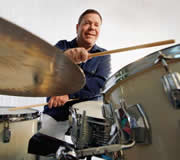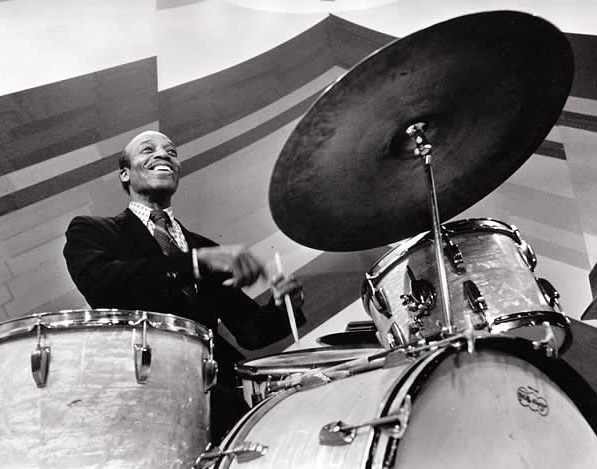You don’t hear much about comic Jackie Gleason anymore, unless it has to do with his involvement in ground-breaking sitcom, “The Honeymooners.” Then again, the names of Jack Benny and Bob Hope are rarely heard these days, and if it weren’t for the aggressive marketing of the “Best of Carson” DVDs, Johnny Carson would be pretty well forgotten as well.
Gleason, however, was the only one who had a connection to jazz, and it was a reasonably substantial one.
“The Great One,” as he was christened by Orson Welles after a long night on the town, had many talents and it was long a part of Hollywood folklore that he was a world-class composer and conductor. Several of Gleason’s biographers did set the record straight by saying that Gleason had not a whit of professional musicianship, though they did stress he was an enthusiastic fan and had a good idea of what would sell. His 43, best-selling albums of string-laden mood music for Capital Records were and are textbook examples..
Always a lover of the big bands, and frustrated by what he perceived to be their lack of proper presentation on television, Gleason first produced something called “America’s Greatest Bands,” hosted by Paul Whiteman in the summer of 1955. Guests included Basie, Ellington, Percy Faith, Ralph Flanagan, Gene Krupa and the host himself. It didn’t last, and unfortunately, video or audio of the series has yet to be discovered.
The same year, Gleason produced the summer replacement program, “Stage Show,” that starred the recently-reunited Dorsey Brothers, who played host for two seasons to some noteworthy guests. Those guests included Sarah Vaughan and Duke Ellington, and drummers in the Dorsey band were Louie Bellson and Buddy Rich. Oh, yes, a guy named Presley made his first television appearances on “Stage Show,” not the “Ed Sullivan Show.” As for the Dorsey’s, and it’s said that Gleason was actually behind the reconciliation, the tube exposure gave their band a much-needed shot in the arm and helped land them lucrative and steady engagements in the New York area and nationally. Had Tommy not died in 1956 and Jimmy a year later, the band could have lasted at least another 20 years.
The true story of Jackie Gleason’s mood music enterprise was another story. He certainly saw the market for “creating romance via the hi-fi,” but as the story goes, the original demos were awful and no record company was interested in the idea. Gleason financed all the sessions himself, and wouldn’t stop until he got what he wanted, in terms of sound. In the beginning, that sound featured Bobby Hackett playing cornet against a big bank of strings. Capital eventually picked up the franchise, and though the details of Gleason’s deal with Capital hasn’t been revealed, the comic was a hard bargainer throughout his career, and I am certain that he retained some, if not all, ownership of the masters. Remember, too, that Gleason owned “Stage Show,” owned “America’s Greatest Bands,” and owned “The Honeymooners.” His deal with the gentle Bobby Hackett was said to be akin to indentured servitude. Again, this isn’t fact, but it has been reported that the cornetist not only received average, flat cash fees for his participation, but that he signed a “non-compete” clause that specified that he could not record in similar contexts under his own name. Ample evidence of this are the two mood music albums he made for Columbia Records in 1960, where the mood is set–not by strings–but by a pipe organ!
Over the years, and the mood LPs were issued until 1969, Gleason used a number of jazz players as soloists, including Toots Mondello, Roy Eldridge, Charlie Ventura, Buddy Morrow, Pee Wee Erwin, Bernie Leighton, arrangers Billy May, Pete King and George Williams; and sidemen such as Milt Hinton and Jimmy Crawford. The Gleason recordings are probably the only ones of their kind to remain continuously in print.
The jazz side of Jackie showed up again in 1959, when he hosted the forth and final “Timex All-Star Jazz Show,” subtitled “The Golden Age of Jazz.” Those of you who’ve obtained this title from JazzLegends.com are aware of the array and level of talent on this program, which is highlighted by the only existing film footage of Louis Armstrong and Dizzy Gillespie performing together. “The Golden Age of Jazz” accurately shows Gleason as the enthusiastic, breathless jazz fan that he was. It also appears he may have been partying it up a bit before broadcast, which was not unlike Gleason.
Eight years later, “The Great One” was still riding pretty high on CBS television as the host of the “American Scene Magazine” variety hour. The summer replacement show for “American Scene Magazine” was something called “Away We Go” (Gleason’s comedic catch line), starring none other than Buddy Greco, George Carlin and the brand new Buddy Rich band. It is not known whether Gleason owned “Away We Go,” but he had enough clout at CBS to strongly suggest they use Buddy and the big band.
Jackie and jazz? Who would have thought? Whatever stories you may have heard about the temperament of “The Great One,” he was one of the few high level celebs in show business to do something for the music and the musicians he loved. — Bruce Klauber






